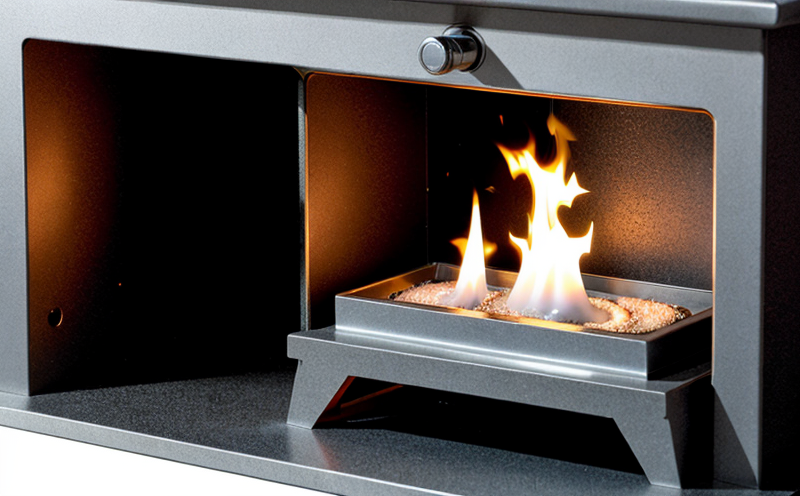Flame Spread Testing of Marine Interior Panels
The Flame Spread Testing of Marine Interior Panels is a critical component in ensuring the fire safety and structural integrity of ships. This testing evaluates how rapidly flames spread across the surface of materials used within the interior spaces of marine vessels, providing essential data for compliance with international maritime regulations.
In accordance with ISO 6702, this testing is particularly important for ensuring that the materials used in these environments are not only effective in containing fire but also do so without compromising the structural stability of the vessel. The test involves placing a standardized specimen, typically a panel cut from the material to be tested, on a support stand and exposing it to an open flame.
The time taken for the flame to traverse a specified distance along the surface of the specimen is recorded as an indicator of its flame spread characteristics. This measurement helps in determining whether materials meet the required safety standards. For instance, if a panel fails this test by spreading flames too quickly or too far, it may need modification or replacement with a more fire-resistant alternative.
Understanding these parameters is crucial for quality managers and compliance officers responsible for ensuring that all onboard materials comply with international maritime regulations such as the International Maritime Organization (IMO) guidelines. R&D engineers can leverage this information to innovate new materials that provide enhanced safety features without sacrificing functionality or aesthetics.
In terms of procurement, specifying flame spread testing early in the selection process ensures that only qualified suppliers are chosen for critical components like interior panels. This proactive approach not only enhances overall vessel safety but also helps avoid costly rework and recalls later on in the project lifecycle.
The marine environment presents unique challenges due to factors such as humidity levels, salt spray exposure, and temperature variations compared to typical terrestrial applications. These conditions necessitate robust testing protocols that account for these environmental stresses when evaluating materials' performance.
Testing laboratories specializing in this area must adhere strictly to the prescribed standards to ensure accurate results. Proper specimen preparation is paramount; any deviation could lead to misleading test outcomes, impacting decisions made based on those results.
Benefits
- Informed Decision Making: Provides clear insights into the flame spread behavior of materials used in marine interiors, aiding informed decision-making processes.
- Enhanced Safety: Ensures that only fire-resistant materials are selected for use within vessels, thereby enhancing passenger and crew safety.
- Compliance Assurance: Confirms adherence to international maritime standards such as ISO 6702, ensuring regulatory compliance without compromising on quality or performance.
- Cost Efficiency: Early identification of non-compliant materials through testing reduces potential costs associated with redesigns and replacements later in the project lifecycle.
The results from flame spread tests play a vital role in minimizing risks related to onboard fires while supporting sustainable design practices that balance safety, sustainability, and operational efficiency.
Eurolab Advantages
Accreditation and Expertise: Eurolab is ISO/IEC 17025 accredited laboratory specializing in fire safety testing. Our team of experts has extensive experience in conducting flame spread tests, ensuring accuracy and reliability.
Comprehensive Testing Capabilities: We offer a wide range of testing services tailored to meet the specific needs of our clients across various sectors including marine, automotive, aerospace, and more.
State-of-the-Art Facilities: Equipped with advanced instrumentation and facilities, Eurolab ensures that all tests are conducted under controlled conditions that simulate real-world scenarios accurately.
Timely Reporting: Our laboratories provide timely and detailed reports based on the latest international standards. This enables our clients to make informed decisions promptly without delays.
Use Cases and Application Examples
| Use Case | Description |
|---|---|
| New Material Development: | Testing new materials before incorporation into marine interiors to ensure they meet all required safety standards. |
| Compliance Audits: | Conducting audits on existing materials to verify ongoing compliance with relevant regulations and guidelines. |
| Retrofit Projects: | Evaluating materials intended for use in retrofitted vessels to ensure they meet current standards without compromising structural integrity. |
| Supplier Evaluation: | Assessing the quality and safety of materials supplied by different manufacturers before final selection. |
In addition to these use cases, flame spread testing is also essential for R&D activities aimed at developing new fire-resistant materials. These tests help researchers understand how changes in material composition or structure affect its flammability properties, guiding further development efforts towards more effective solutions.
- New Material Development: Testing prototypes and samples of newly developed materials before they are fully integrated into the design process.
- Retrofit Projects: Evaluating modifications made to existing structures or components to ensure they meet updated safety requirements without compromising performance.
These examples demonstrate just how integral flame spread testing is across various stages of product lifecycle management within the marine sector. By incorporating these tests early on, stakeholders can identify potential issues early and address them proactively rather than reactively.





